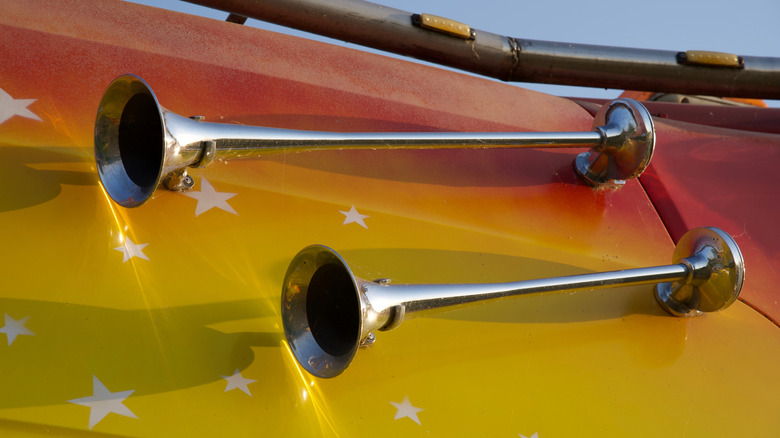Why Do Semi Trucks Have Air Horns?
Few things are quite as jarring to experience while driving as the explosive sound of a semi-truck horn blaring through the streets — unless you're purposefully seeking out a trucker salute. Given the already gargantuan size of most semi-trucks, the inclusion of an ear-spitting horn may seem like an excessively tacked-on way to alert their presence. However, what most may not immediately realize is that the sound produced by semi-trucks nowadays has stemmed out of a societal necessity.
Just as with regular cars, the purpose of semi-truck horns is to alert drivers of their presence, as well as make people aware of hazards that may not be as noticeable. An air horn is essential for semi-trucks as a way of making a clear distinction between them and other vehicle types that populate the roads. These horns can reach up to 120 decibels and be heard up to a mile away in some cases, the same level of sound typically produced by thunderclaps, chainsaws, and rock concerts. As our roads get more crowded and filled with noise, it's become increasingly difficult for vehicles to distinguish themselves from one another. This is especially important for moments where visibility is compromised by environmental aspects such as bad weather, blind spots, and obstructions that may make it difficult for a driver to accurately gauge their surroundings.
Truck drivers have to be careful with how much they honk their horns
No one is claiming that the explosive sound of a truck horn is fun, but there's no denying its necessity on increasingly jam-packed city streets. However, even though some truckers may seem more aggressive with their horns than others, you'll never find them doing so as much as train conductors. As a whole, it pays for those who operate heavy commercial vehicles to exercise caution with regard to how much they use their horns.
Truck horns are actually more delicate than you might expect. Overtime, particles and debris can clog up the air compressor, ultimately compromising its performance. Corrosion, moisture buildup, and loose sections can also occur and negatively affect your horn in the long run. As a result, it's crucial to keep it maintained by keeping the horn clean and lubricated, as well as inspecting and regularly testing it out to ensure there are no problems.
Additionally, there are many rules and regulations to keep in mind when it comes to the sound and frequency of a horn being used. The overuse of a horn can become a serious hazard on the road, distracting and frustrating drivers. The U.S. Department of Transportation has many rules set in place regarding what kind of horns that can be used, how they can be used, and what penalties can arise for breaking these rules. This limits the kind of horns truck drivers can use, leaving most DIY models out of the picture.

